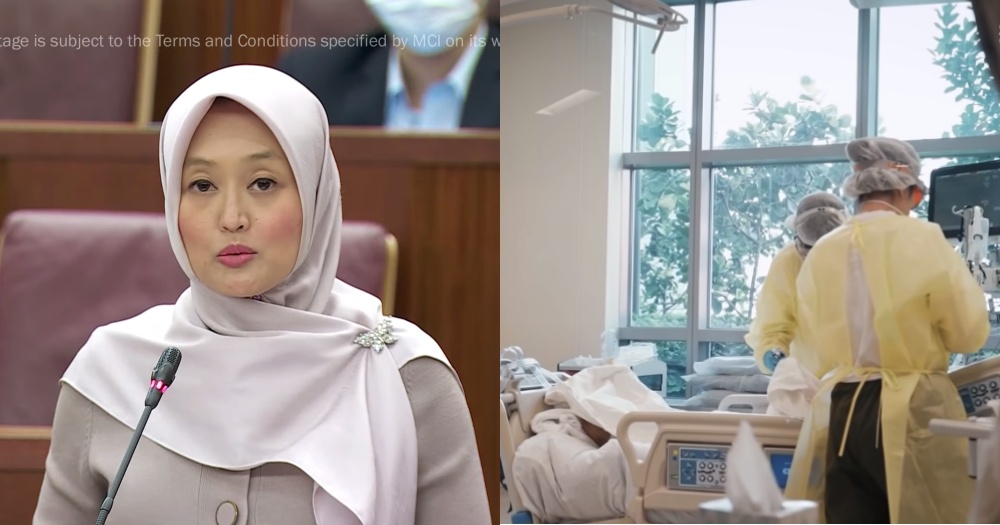Follow us on Telegram for the latest updates: https://t.me/mothershipsg
The overall attrition rate for public sector nurses has increased over the last five years, though the rate among local nurses is stabilising, said Senior Parliamentary Secretary for Health Rahayu Mahzam in Parliament on Aug. 2.
The attrition rate among foreign nurses has increased more significantly, owing to more intense international competition as borders have re-opened, said Rahayu.
Slight overall increase in attrition rates among local nurses
Rahayu shared that among local public sector nurses, the attrition rate increased from 6 per cent in 2017, to 6.3 per cent in 2018, and 7 per cent in 2019.
It then dropped to 5.4 per cent in 2020, before increasing to 7.4 per cent in 2021.
Attrition rates among foreign public sector nurses have risen more significantly, from 8.2 per cent in 2017, to 9.1 per cent in 2018, and 9.4 per cent in 2019.
It dropped to 7 per cent in 2020, and increased to 14.8 per cent in 2021.
Rahayu was responding to questions posed by Nee Soon GRC Member of Parliament Louis Ng, who asked about resignations among nurses and their welfare.
Key issue is retaining nurses
Rahayu said the key issue was in retaining nurses.
She then outlined the Ministry of Health's (MOH) strategy to stabilise the nursing workforce.
This included reviewing the scope of work that nurses are doing to enable them to spend more time on direct patient care, and to ensure that remunerations are competitive, both locally and internationally.
In reviewing nurses' scope of work, Rahayu said that public healthcare institutions reduce administrative workload for nurses by streamlining care processes and deploying dedicated administrative and support care to assist nurses over time.
To ease the load of non-clinical and administrative tasks, the ministry has also introduced innovations in automation, technology, robotics and AI-enabled technology.
Foreign public sector nurses attracted by prospects overseas
Rahayu said that while salaries and working conditions of nurses are important, and that the MOH is "constantly looking" at how to improve them, one should avoid jumping to the conclusion that they are the root of manpower problems.
She said that international competition for nurses meant that Singapore is losing nurses locally.
"Our issue that we're seeing right now is the fact that we are losing foreign nurses. Due to the pandemic, now that the borders are open, they can go back. They are also being attracted by prospects overseas," she added.
Welfare of nurses
Ng then asked if MOH can ensure that guidelines on adequate rest for nurses can be adhered to, given that local nurses may be placed under more stress as more foreign nurses leave Singapore's workforce.
Rahayu said she understood the concerns, and assured Ng that a cross-cluster staff wellbeing committee that was formed in 2019 has raised the issue of giving sufficient rest to nurses.
She said some of the recommendations by the committee have been implemented.
Tripartite workgroup looking into abuse and harassment of healthcare workers
In her earlier reply, Rahayu also said that one of the recommendations from the committee was to look deeper into the issue of abuse and harassment of healthcare workers.
In March 2022, it was announced that a tripartite workgroup was formed to address this issue nationally.
Other support measures for nurses have also been implemented to improve the welfare of nurses.
For example, chief wellness officers have been appointed in each healthcare cluster to oversee and develop system changes to improve the wellbeing of all health care staff.
Counselling services, peer support networks and staff support assistance plans have also been put in place to support staff, added Rahayu.
She said that while MOH does not impose a minimum number of rest hours, duty rosters for nurses are planned in advance to ensure staff have adequate rest between shifts.
"Even as we prioritise the wellbeing of our nurses, we appreciate the reality of their work, which is to deliver timely and quality patient care. The ministry is working to ensure that there are sufficient nurses on the ground," she added.
Top photos via MCI/YouTube and Mothership
If you like what you read, follow us on Facebook, Instagram, Twitter and Telegram to get the latest updates.
